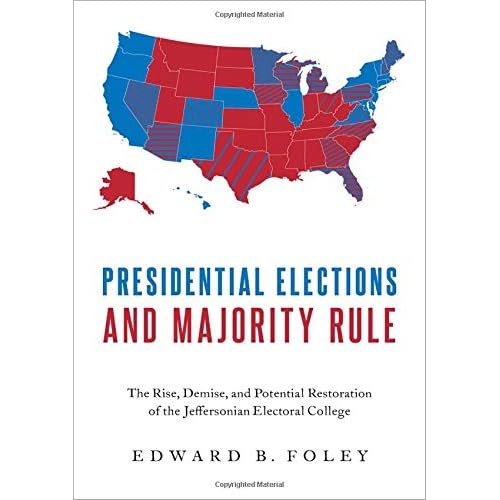Book Details Title: Presidential Elections and Majority Rule: The Rise, Demise, and Potential Restoration of the Jeffersonian Electoral College | |
Book DescriptionReview “Nobody writes more thoughtfully about the theory and historical practices of American elections than Foley.�This book is a model of careful argument” — Sanford Levinson, author of�Framed”This book should be read by everyone interested in the conduct of U.S. presidential elections. Informed by deep historical scholarship into the origins and meaning of the Twelfth Amendment, Presidential Elections and Majority Rule�illumines the path along which our electoral system strayed from the principle of majority rule. Foley also offers, and makes a strong case for, a statebystate policy approach that would bring our presidential elections back in line with that principle without amending the Constitution” — Alexander Keyssar, Matthew W. Stirling, Jr. Professor of History and Social Policy, Harvard Kennedy School and author of�Why Do We Still�Have the Electoral College?”Presidential Elections and Majority Rule�brilliantly sheds light on the importance of the Twelfth Amendment in recasting the Electoral College as a majoritarian institution that disfavors the election of candidates preferred by only a plurality of the electorate. This book is not only timely, but a masterful, scholarly must read” — Franita Tolson, Vice Dean for Faculty and Academic Affairs, Professor of Law, USC Gould School of Law”Presidential Elections and Majority Rule is essential reading for anyone concerned with how the U.S. chooses its President. Drawing upon a deep understanding of the historical sources on the Electoral College, Foley argues that a fundamental flaw in the system is increasingly likely to result in winners who are not favored by a majority of voters in each of the states making up the winner’s Electoral College majority. Foley explains why this is a problem for democratic legitimacy and offers practical solutions that do not depend upon quixotic calls to amend the U.S. Constitution.” — Richard L. Hasen, author of�Election Meltdown”This powerful, original account of the purpose and design of the Electoral College will be the most important guide to anyone trying to understandand preservewhatever genius there was in this odd institution. It offers critical and urgent advice to anyone trying to reform it now. The pieces come together in this beautifully crafted account.” — Lawrence Lessig, Roy L. Furman Professor of Law and Leadership, Harvard Law School, and author of�They Don’t Represent Us Read more About the Author Edward B. Foley directs the election law program at Ohio State University, where he also holds the Ebersold Chair in Constitutional Law. Previously, Foley clerked for Chief Judge Patricia M. Wald of the U.S. Court of Appeals for the D.C. Circuit and Justice Harry Blackmun of the United States Supreme Court. He has also served as State Solicitor in the office of Ohio’s Attorney General, where he was responsible for the state’s appellate and constitutional litigation. He is the author of the acclaimed book Ballot Battles: The History of Disputed Elections in the United States (Oxford University Press) and co-author of Election Law and Litigation: The Judicial Regulation of Politics. Read more Customers Review: We, the voters, regardless of party affiliation, must elect a president that a majority of people want. This is the gist of (Thomas) Jeffersonian rule and the bottom line of Foley’s book. The author does a great job of describing elections in which this goal was not reached, three times since 1992. One of the author’s suggestions for remedy, Instant Runoff Voting (IRV). Voters give second and third choices, which can be added to the first place votes, if need be, to form a majority vote.
| |

